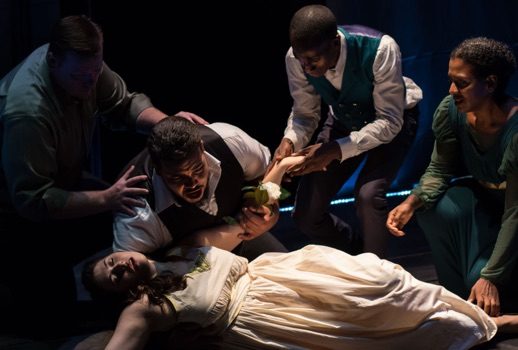
Trafficking in the bawdy transactions of courtesans, love’s reckless foolishness, and the humiliation of sickness, both La Traviata and Manon are fixtures within the operatic and cultural canon, demanding a great deal of virtuosity from the performing artist, both dramatically and vocally.
To prepare roles such as Violetta, Manon, Alfredo, and Des Grieux (just to name a few), opera singers require a rare tool in their tool box: experience; and here is where dell’ arte steps in. The ensemble functions as an apprenticeship for aspiring professionals. Working, as their mission statement claims, to “bridge the gap” between the safety of the conservatory and the harsh demands of a professional career, dell’ arte offers classes and stage experience for singers looking to break into the business. As such, La Traviata was mounted in order to provide the apprentices with a performance opportunity in the standard repertoire.
As Malcolm Gladwell’s notion of the ten thousand hours suggests (see his book Outliers for more on this), an artist’s success requires a great deal of practice—most of which entails the freedom to experiment, as well as the less glamorous freedom to fail. This process is alchemical, refining the cruder elements of the artist’s talent into a finely wrought, and, one hopes, long lasting career. The path toward excellence is often rife with bumps and bruises, forging fires, missteps that serve as hard-earned lessons. These brave leaps forward require intense amounts of courage, as well as a healthy dose of humility.
Having said that, I would like to preface my criticism with the understanding that I write with an eye toward the future—considering not so much what was, but what may be. dell’ arte is not a professional company, but an apprenticeship, one that provides young singers with the valuable tool of experience. And so to judge last night’s performance of La Traviata against the expectations of a professional company would be a bit unfair.
However, while my assumptions regarding dell’ arte may be different from that of paid professionals, my respect for the ensemble remains extremely high. It takes courage to get up on any stage, especially at the beginning of one’s career. In this spirit, I believe dell’ arte’s performance of La Traviata deserves encouragement, more than anything else; the performers involved displayed genuine potential, and I hope they continue to pursue their craft with passion and conviction.
Embryonic, in the best sense of the word, this iteration of La Traviata seemed to circle thoughtfully around the needs of the cast. With elementary, though not unpleasant, staging by Kyle Pfortmiller, the story of a courtesan selflessly sacrificing her lover for the sake of his family’s respectability was clearly delineated, and the unfussy direction relied on the singers’ abilities to command attention. With a set consisting of clear, glass-like chairs, and a stage lined with blue, modernist lights, the atmosphere felt strangely anachronistic, minimalist and sleek, but also conducive to the opera’s drama.
Regarding the performances of the cast, tentative might be the best word to describe them—and understandably so. Opera is a daunting enterprise. As the singers essayed their roles for the first time, an overall sense of insecurity plagued the ensemble. However, within this uncertainty were tough nuggets of talent, waiting to be mined for optimum effect. And, to be fair, part of this mining was the process on display.
In the role of Violetta Valéry, Bonnie Frauenthal tackled the character’s taxing demands of charisma, grace, and vocal acrobatics with admirable promise. And while her technique seemed to fail her slightly during the famous “Sempre libera,” she brought a wide-eyed, fresh-faced innocence to the role, one that worked against the worldly implications of Violetta’s licentious past. I hope that over time Frauenthal will find her footing within the part, and that this security will allow her to enact the character’s febrile trajectory more freely, perhaps with a hint of tempestuous bombast thrown into the mix.
As Alfredo, Jose Heredia was vocally secure, though his stage presence seemed more anemic than passionate. Like his Violetta, he was overly cool and hesitant, despite his vocal earnestness—perhaps the tenor was mentally cleaving too closely to his technique to fully embody the character? His singing would have benefited from an overall sense of abandon to the drama, committing fully to Alfredo’s position within the opera’s plot.
Closer to this ideal was Jeremiah Johnson as Giorgio Germont, Alfredo’s father. A stable vocal presence, Jeremiah displayed a nicely resonant baritone; and Johnson was equal parts imposing and sympathetic, a difficult ambivalence to enact. Moreover, his act II aria “Di Provenza il mar” was rhetorically effective, not to mention competently sung.
The orchestra, conducted by John Spencer IV, responded sensitively to the singers, restrained enough to allow them to perform their roles without pushing or over singing. This moderation buoyed the cast without dominating the opera’s soundscape, permitting the unsettled apprentices to work their way through the score.
According to its mission statement, dell’ arte’s Traviata fulfilled the organization’s objective. When understood as a bridge between the studio and the professional stage, one can admire the chutzpah these singers posses, their willingness to take on the herculean tasks of creating opera, to allow experiences like these shape them on the way toward a career. With time, I believe these performances will evolve into more fully realized achievements. And when that happens, I look forward to seeing them, in all their professional polish.
Photo by Mark Baker.



